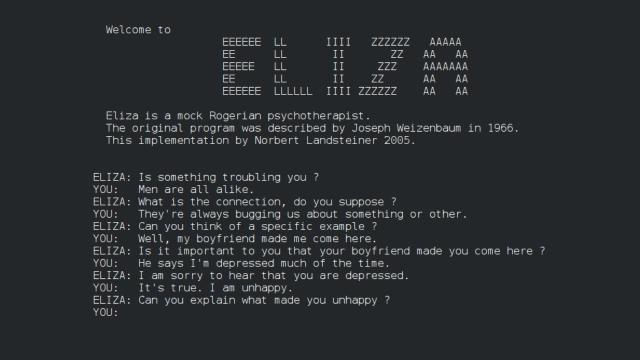A recent review of Serious Games literature reaching all the way back to 1964 found that despite repeatedly finding potential for games to treat depression, the method remains underused.
The narrative literature review in Sage Journals looks into the history of Serious Games as therapy, the 1960s when the idea was looked upon as a joke, until now when it’s seemingly all the rage, yet not widely used in practice.
The ELIZA program in 1964 aimed to repeat a user’s input back to them, a form of active listening which emulated Rogerian, or “person-centred” therapy. By using the user’s own inputs as inspiration for responses calculated by a primitive natural language processing (NLP) system, the user’s own, in-built tendency towards self-actualisation would be realised.
The project was actually intended to prove the superficiality of such an idea, according to the report, but backfired when the interactions proved famously convincing. Despite this, only one small psychotherapy study was done using the program, with slightly positive results, in 1984.
In the 1970s, the idea of a computer providing therapy began to be explored a bit more, and in the 1980s with home PCs becoming more accessible, programs like MORTON were able to offer cognitive behavioural therapy (CBT).
These programs were generally considered to be “not there yet” and there was a subsequent gap in this field of research throughout the ’90s.
In 2017, Australasian game SPARX-R was shown to reduce depression symptoms in a randomised control trial with 540 year 12 students in Sydney. You can actually try a version of the app here.
That’s in line with a 2017 review that looked at 10 randomised control trials testing the effects of serious games on mental health disorders. It found “a significant moderate effect size for serious games on depression symptoms and demonstrated that those who received the intervention received no significant benefit from additional involvement with a therapist.”
Later in 2020, a review of 34 randomised control trials found a positive, medium-sized effect of serious games on physical and mental health. There are additional examples of other types of serious games, such as VR, having a positive effect in the report.
The recent review’s conclusion gives the classic “more studies are necessary” line. But despite all this positive evidence, serious games “and CVGs as therapeutic tools remains limited in clinical settings, and few therapists practice them as a part of their clinical work.”

Leave a Reply